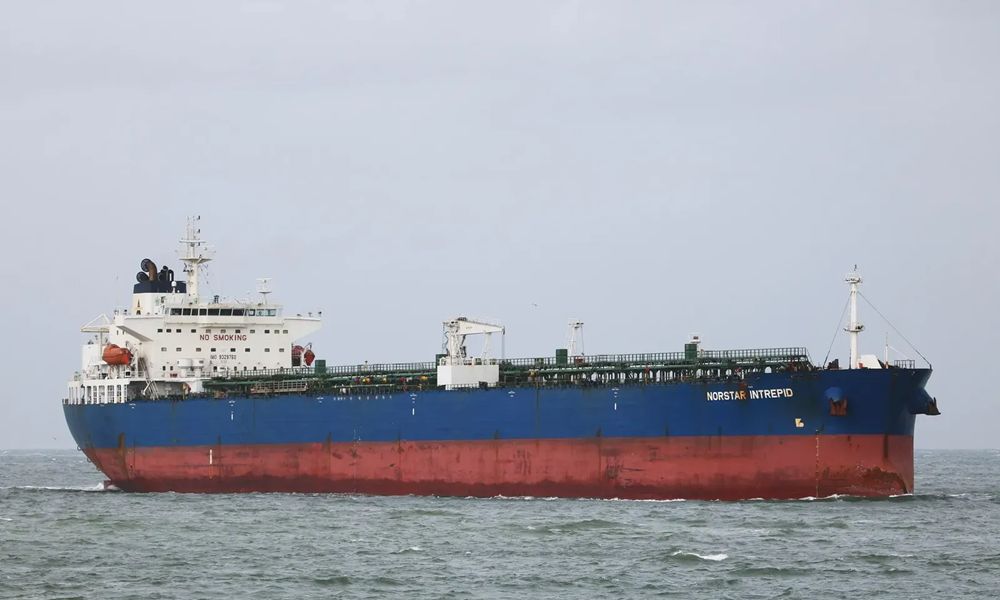ENB Pub Note: And for those Californians, the shadow fleet rust buckets that are prone to leak are the ones delivering 70% of your oil, thanks to Gavin Newsom.
- Russia’s shadow fleet now accounts for around 17% of all global oil tankers, with hundreds of ageing ships transporting crude to countries like China, India, and Turkey.
- The use of unmarked, uninsured vessels raises serious environmental concerns, with experts warning of a potential oil spill catastrophe in the Baltic Sea.
- Despite U.S. and EU sanctions, Moscow’s reliance on shadow fleets has sustained oil revenues, highlighting both the limits and unintended consequences of Western energy sanctions.
Are you Paying High Taxes in New Jersey, New York, or California?
Shadow fleets are “dark fleets” that use a range of practices to avoid detection when transporting illegal or sanctioned products. Many of the vessels used to circumvent sanctions are older, meaning they do not have the same detection technologies as newer tankers. Others have their automatic identification systems disabled to avoid tracking. Some of the vessels operate in a legal grey area, using tactics like spoofed GPS, false flags, and fake insurance documents. Many experts are concerned about the seaworthiness of these vessels.
The shadow fleet accounts for roughly 17 percent of all in-service oil tankers in the ocean today, according to the research firm S&P Global Market Intelligence. The average age of the shadow vessels is around 20 years, compared with 13 years for the overall global oil fleet. The office director of Greenpeace Ukraine, Natalia Gozak, said that the “Lack of insurance combined with the really old vessels… increases the risk of environmental catastrophe.”
In December, 12 countries, including the U.K., Germany, Poland, the Netherlands, five Nordic nations, and the three Baltic states, agreed to disrupt and deter Russia’s shadow fleet following several unexplained cable cuts and undersea incidents around critical infrastructure in the Baltic Sea. In May, the U.K. introduced new sanctions against 100 oil tankers that were found to be part of a shadow fleet.
Many of these ships are delivering discounted Russian crude to countries that continue to purchase Russian energy products, such as China, India, and Turkey. While some tankers lost coverage after suspected sanctions violations, many use alternative insurers to continue operations. Often, new ships will replace those that have been blacklisted, as Russia’s shadow fleet continues to grow. In addition, several new Russian insurers have emerged to offer alternative cover for Russian crude shipments. It is not certain how claims payouts would work in the case of a spill.
In August, the Trump administration discussed the potential introduction of sanctions targeting Russia’s shadow fleet to restrict the country’s oil revenues, which provide financial support for its ongoing war against Ukraine. These sanctions add to other financial constraints placed on Moscow in recent years, such as price caps, restrictions on Western insurance and financing, and sanctions on specific shipping entities. However, there are questions over what stricter sanctions on the movement of Russian oil would do to global oil prices.
Despite efforts to reduce the number of dark vessels moving through Europe’s waters in recent months, hundreds continue to traverse a narrow passage in the Baltic every day. Some of these ships are accompanied by Russian military vessels, while others have planes following their route to provide security. The Baltic authorities often try to communicate with people on board the shadow fleets to get a better picture of their movement, and many have been responsive. Although authorities have little ability to act outside of national waters.
The Swedish coastguard Joakim Håkansson discussed the situation with the newspaper The Guardian on a recent expedition to better understand the extent of the shadow fleets operating in the region. Håkansson said, “There are hundreds of [shadow] ships moving in the Baltic all the time. And it’s a lot for our little sea here.” He added, “We see ships that have never been seen in the Baltic before that we come across now.” The coastguard must now understand how seaworthy the ships are, Håkansson said, “because if there was an oil accident with these ships, there would be an oil catastrophe in the Baltic”.
Despite strict U.S. and EU sanctions on Russian energy, Moscow seems to be largely unaffected by these sanctions, thanks to its rapid move to use shadow fleets. Russia now uses a vast network of ageing ships to deliver its crude around the globe with few repercussions, ensuring it can still get vital energy revenues. The sanctions on Russian energy have, instead of restricting the purchase of Russian crude through legitimate channels, pushed Moscow to use illegal methods to transport oil, which increases the risk of environmental disaster.
While the introduction of sanctions on Russian energy helped to reduce Moscow’s oil revenues by discouraging many world powers from purchasing Russian crude, it has not stopped the export of the oil entirely. Russia has instead invested heavily in using shadow fleets to ship its crude to the countries that are still willing to take it, which has spurred significant environmental concerns, as well as helped Russia sustain its oil revenues.
By Felicity Bradstock for Oilprice.com
Avoid Paying Taxes in 2025
Crude Oil, LNG, Jet Fuel price quote
ENB Top News
ENB
Energy Dashboard
ENB Podcast
ENB Substack

